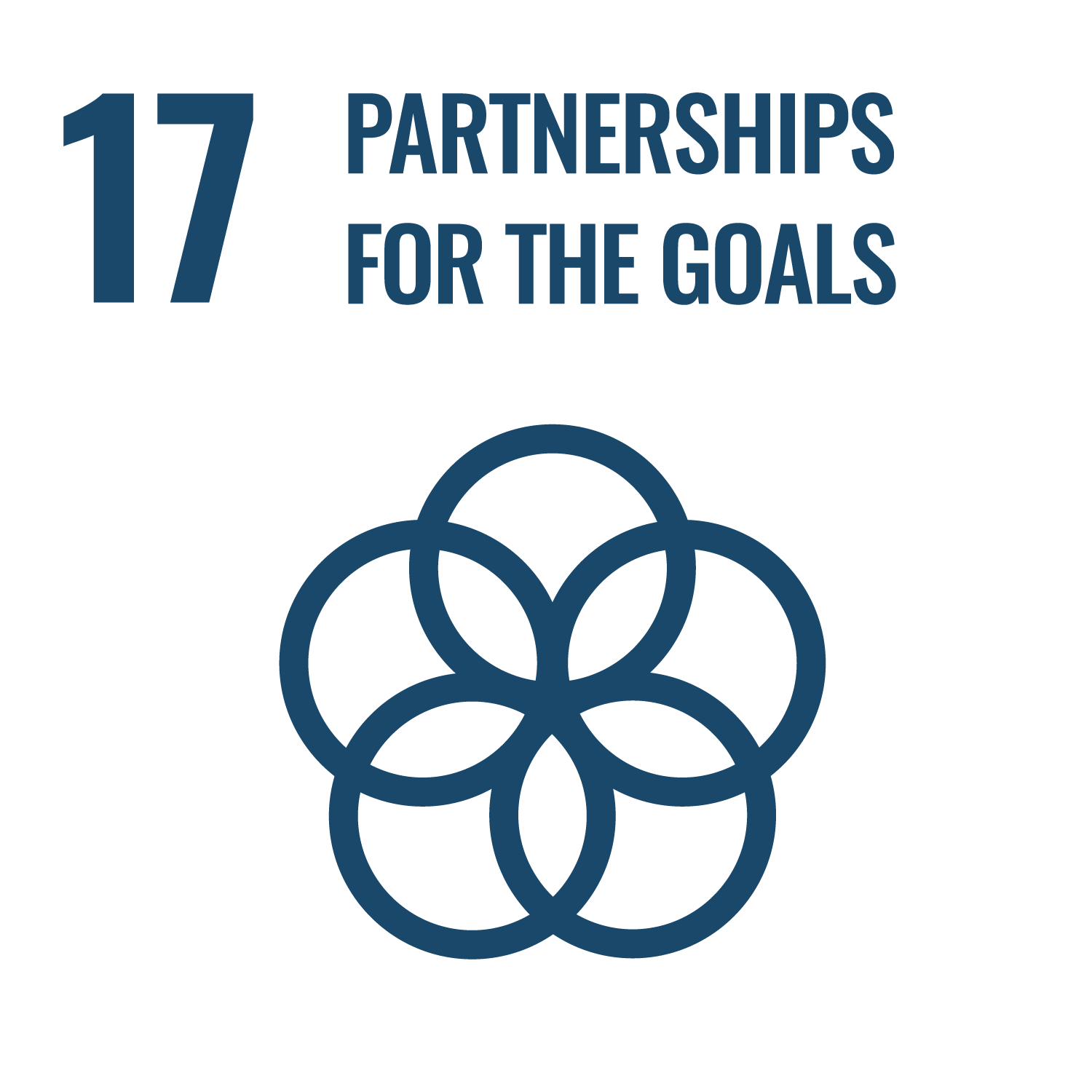 Goal 17. Partnerships to achieve the Goal
Goal 17. Partnerships to achieve the Goal
17.4.2 Education for SDGs specific courses on sustainability
2023-2024
AASTMT maintains a strong commitment to embedding sustainability within its academic pathways by providing a selection of dedicated courses and learning options that directly engage with SDG-related themes. These offerings give students structured opportunities to explore sustainability concepts, understand global challenges, and develop practical competencies connected to environmental and socio-economic issues. Alongside classroom learning, the university encourages participation in sustainability-oriented projects and experiential activities, ensuring that students gain a well-rounded perspective on sustainable development. This integrated approach reflects AASTMT’s ongoing effort to prepare graduates who can actively contribute to advancing the SDGs in their professional and community roles.
B.Sc. in Digital & Sustainable Business Economics
This undergraduate major introduces students to contemporary approaches in sustainable economic development, integrating environmental considerations with digital innovation. The program equips learners with the analytical and managerial skills necessary to support responsible economic growth while addressing evolving sustainability challenges.
B.Sc. in Digital & Sustainable Business Economics
Sustainability & Energy in Buildings (ECB3302)
This course provides students with an in-depth exploration of sustainable building practices, focusing on energy-efficient design, renewable energy integration, and performance assessment of building systems. It enables learners to understand how engineering decisions influence environmental outcomes and supports the development of practical skills in green construction.
Sustainability & Energy in Buildings
Energy Efficient Operation of Ships (NGPSS 1020)
In line with AASTMT’s emphasis on embedding sustainability principles within its educational pathways, this course enhances learners’ capacity to apply environmentally conscious practices in maritime operations. Energy Efficient Operation of Ships (NGPSS 1020) provides a structured understanding of the environmental implications of ship performance, highlighting fuel-efficient strategies, emissions reduction, and alignment with international climate-related standards. Through its focus on greenhouse gas impacts, SEEMP implementation, and key energy-performance indicators such as EEDI, EEXI, and CII, the course offers a comprehensive learning experience that prepares students to address contemporary sustainability challenges in the maritime sector.
Energy Efficient Operation of Ships
M.Sc. in Renewable Energy and Environmental Engineering
This postgraduate program offers comprehensive academic training in renewable energy technologies, environmental assessment, and sustainable engineering solutions. By combining theoretical foundations with applied methodologies, the program prepares graduates to analyze and design systems that support cleaner energy production and improved environmental performance.
M.Sc. in Renewable Energy and Environmental Engineering
Environmental Studies in Architecture and Urban Design (AR713)
This postgraduate course, offered within the M.Sc. in Architectural Engineering and Environmental Design, examines environmentally conscious architecture and the relationship between natural and built environments. Students explore ecological design principles, environmental assessment methods, and sustainability-focused planning approaches. By emphasizing resource efficiency, environmental performance, and responsible urban development, the course provides a dedicated academic pathway that strengthens learners’ abilities to integrate sustainability considerations into architectural and urban design decisions. In doing so, it contributes to expanding the range of sustainability-oriented courses within the university’s formal curriculum.
Topics in Sustainability (AR423)
This undergraduate course offers a structured introduction to sustainability concepts, contemporary environmental challenges, and practical approaches to responsible development. It exposes students to established sustainability frameworks, environmental evaluation tools, and principles of responsible design. Through its multidisciplinary approach, the course encourages analytical thinking and problem-solving related to environmental and socio-economic issues. As a focused academic offering, it broadens students' access to sustainability-related learning within the curriculum and supports the development of competencies aligned with global sustainability priorities.
MSc in Euro-Mediterranean Environmental and Climate Systems Management (SECCM)
The postgraduate program in Euro-Mediterranean Environmental and Climate Systems Management provides an advanced, multidisciplinary curriculum focused on understanding and responding to climate challenges. The program combines scientific knowledge with applied tools to analyze climate drivers, assess environmental impacts, and support adaptation and mitigation strategies. Graduates acquire practical and analytical capabilities that prepare them for careers in environmental governance, research institutions, and climate-related industries. Delivered in collaboration with international partner universities, the program equips learners to address environmental challenges across Egypt, the wider Arab region, and Europe, making it one of the most distinctive climate-focused master’s pathways in the region.
2022-2023
The Arab Academy for Science and Technology (AASTMT) integrates sustainability into its curriculum and activities, offering courses like "Sustainable Development" and "Climate Change and Water Management," alongside the specialized master’s program in Smart Environmental and Climate Change Management (SECCM). Key initiatives, such as ESSD 2023 and IEEE-YESIST12, promote innovation and practical skills in sustainability. Programs like YEP MED and training with the Egyptian Stock Exchange further prepare students to address environmental and economic challenges. AASTMT’s holistic approach empowers students to drive sustainable development and tackle global issues effectively.
Sustainable Development Course
AASTMT offers dedicated courses that address sustainability and the SDGs, ensuring that students are equipped with the knowledge and skills to contribute to global sustainability efforts. Sustainable Development (UNR1602) explores the intersection of sustainability and Information and Communication Technology (ICT), covering topics such as green ICT practices, renewable resources, and systems thinking, which are vital for driving sustainable development.
Climate Change and Water Management
The purpose of this course is to explore the significant issue of climate change and how it affects sustainable development goals. The course prepares the next generation to take on real-world difficulties through effective initiatives. It addresses the critical challenges of climate change and contributes to a more sustainable future.
Climate Change and Water Management
Master of Science Degree in Euro-Mediterranean Smart Environmental and Climate Change Management SECCM
This program is unique and distinguished, as it combines natural and applied sciences curricula to study climate changes, their causes and effects, and how to deal with and adapt to them. The program also works to qualify graduates with the knowledge and skills necessary to take on job jobs associated with local, regional and international efforts to deal with climate change, which is one of the greatest current challenges of modern societies. The Master of Smart Management of Environment and Climate Change program is at the forefront of programs in preparing students to manage climate changes in the local, regional and international environmental, research and industrial sectors. The graduate meets the need of the growing labor market in Egypt, the Arab countries and Europe since there are joint European universities in teaching the program, and that this specialization is a unique study in the middle east region as general.
Modules of the master program include Introduction to Climate Change - Meteorology and Climate Observation - Marine Resources and Sustainability - Environment Risk Assessment and Management- Climate Change Management- Numerical Modelling and tools - GIS and Remote Sensing - Data Analysis and Processing - Research Methodology - Master’s Thesis
Master of Smart Environmental and Climate Change Management (SECCM)
Youth Employment in Ports of the Mediterranean (YEP MED)
YEP MED was held in 2023 and developed Technical and Vocational Education and Training (TVET) programs tailored to the specific needs of the Mediterranean port sector. These programs addressed key topics such as foreign trade, environmental sustainability, and digitization, providing targeted training to address skills shortages in these areas. By creating structured learning pathways, the project fostered practical education that prepares participants to contribute effectively to sustainable and economic growth initiatives. The program incorporates SDGs 1, 4, 5, 8, 10 and 17.
Youth Employment in Ports of the Mediterranean (YEP MED)
Electrical Energy Efficiency Toward the Achievement of SDGs (ESSD 2023)
The Electrical Energy Efficiency Toward the Achievement of SDGs (ESSD 2023) event, organized by the Arab Academy for Science, Technology, and Maritime Transport (AASTMT), was held in 2023 and focused on innovative engineering solutions to enhance energy efficiency. Through a series of structured workshops and discussions, the event addressed critical topics such as energy sustainability, climate action, and affordable clean energy, equipping participants with specialized skills and knowledge directly aligned with the SDGs.
Designed as an educational initiative, ESSD 2023 offered tailored learning opportunities that bridged theoretical knowledge with practical applications, ensuring that participants were empowered to tackle pressing global challenges. By integrating sustainability principles into these focused sessions, the event reinforced AASTMT’s commitment to embedding SDG principles into formal education frameworks.
Electrical Energy Efficiency Toward the Achievement of SDGs (ESSD 2023)
Youth Endeavors for Social Innovation Using Sustainable Technology (IEEE-YESIST12)
Hosted by AASTMT, this event took place on September 2-3, 2023, uniting young innovators to develop projects centered on sustainable technology. By focusing on the application of green technologies to address social issues, the initiative encouraged collaboration among participants from diverse backgrounds. The event highlights the importance of empowering youth to create impactful solutions through teamwork and innovation, reinforcing the value of partnerships in driving positive change.
Youth Endeavors for Social Innovation Using Sustainable Technology (IEEE-YESIST12)
Training by the Egyptian Stock Exchange
AASTMT collaborates with the Egyptian Stock Exchange to offer practical training aimed at providing students with essential skills in financial literacy and stock market operations. This program prepares future professionals to integrate sustainable economic practices in their fields, equipping them with the expertise necessary to make informed financial decisions.
Education for SDGs specific courses on sustainability (2021-2022)
The Arab Academy for Science and Technology (AAST) actively fulfills the requirements of Sustainable Development Goal (SDG) 17, specifically regarding education for SDGs with specific courses on sustainability. AAST offers targeted and practical courses that address various dimensions of sustainability, incorporating real-world applications and interdisciplinary approaches. By collaborating with industry experts and practitioners, AAST ensures the relevance and impact of these courses, preparing students to become agents of change and contribute to sustainable development.
Master Course between AASTMT and University of Catania (Italy)
SECCM (Accredited by Supreme Council of Universities-Egypt) The program was established with the participation of four European countries (Italy - Greece - Lithuania - Slovenia) and four Egyptian universities (Alexandria University - Suez Canal University - South Valley University - Arab Academy for Science, Technology and Maritime Transport) The program is provided in Two Years This program is unique and distinguished, as it combines natural and applied sciences curricula to study climate changes, their causes and effects, and how to deal with and adapt to them. The program also works to qualify graduates with the knowledge and skills necessary to take on job jobs associated with local, regional, and international efforts to deal with climate change, which is one of the greatest current challenges of modern societies. The Master of Smart Management of Environment and Climate Change program is looking to be at the forefront of programs in preparing students to manage climate changes in the local, regional, and international environmental, research, and industrial sectors. The graduate will meet the needs of the growing labor market in Egypt, the Arab countries, and Europe since there are joint European universities in teaching the program, and this specialization is a unique study in the Middle East region in general.
The program of Environmental and Climate Change Management: Introduction to Climate Change - Meteorology and Climate Observation - Marine Resources and Sustainability - Environment Risk Assessment and Management- Climate Change Management- Numerical Modelling and Tools - GIS and Remote Sensing - Data Analysis and Processing - Research Methodology - Master’s Thesis
Master course on Maritime Postgraduate Studies Institute-Alexandria | AASTMT on AASTMT webpage
Mapping AASTMT Courses with the UN SDGs
In pursuit of genuine commitment to the UN-SDGs, AASTMT has launched an initiative in 2020 that incorporates the 17 goals into all courses of all programs across all campuses. The outcome of mapping curricula to the 17 SDGs is a report that showcases the number of courses across all campuses that comply with each SDG.
Mapping AASTMT courses with the UN SDGs on the AASTMT webpage



